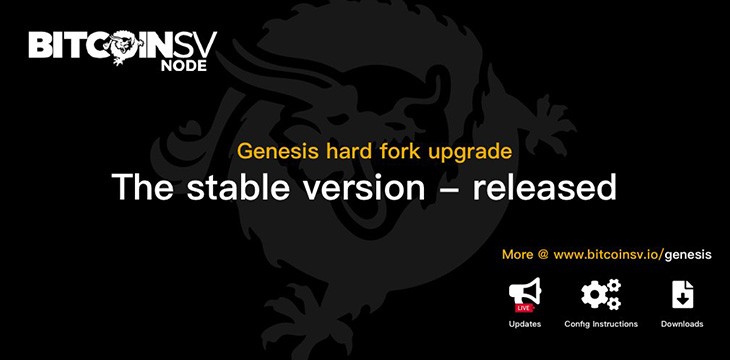|
Getting your Trinity Audio player ready...
|
After a period of beta testing and internal checks, the Bitcoin SV Node team has released the stable version of “Genesis”—or, Bitcoin 1.0.0. All miners are required to install the new software, which will activate on February 4, 2020, and begin a new era for “a fully on-chain world.”
This release represents the final step before Genesis activates on the Bitcoin main chain, enabling its features for all users. The Bitcoin SV Node team is calling this a “restoration” rather than an “upgrade” to the protocol, as it marks a return to Satoshi Nakamoto’s original vision for Bitcoin. That is, a protocol that massively scales on-chain and handles all kinds of data activity, a “ledger of truth” that could eventually even replace the internet itself.
https://twitter.com/BitcoinSVNode/status/1217587524346044416
Restoring power and value to miners
With Genesis’ activation, Bitcoin miners will have greater power to determine how their services are used. This reflects their “skin in the game,” or the time and money they’ve invested to support the protocol—an economic incentive vital to keeping Bitcoin secure. It will also allow them to remain profitable over time, as the supply of mineable Bitcoins decreases.
Mining nodes will need to manually configure two parameters before starting the Bitcoin 1.0.0 software. One is “excessiveblocksize” which allows miners to determine their own maximum block size, and thus the kinds of data services they’ll support. The other is “maxscriptmemoryusageconsensus”, a similar parameter that determines how much memory a data script can use. As mining becomes more specialized, miners will promote their capabilities depending on the use case.
Genesis also includes features to enhance security and keep the network running smoothly, such as Parallel Transaction and Block Verification. These aim to prevent block confirmations slowing down if one is particularly large.
More technical details on Genesis release and activation can be found here.
Bitcoin according to Satoshi’s original vision
1.0.0 also restores Bitcoin’s most famous promise of cheap, fast payments of any size—a promise that got forgotten (often deliberately so) on BTC over the years. Whether you’re buying a book or sealing a multimillion-dollar real estate deal, the payment will process the same way. The same Bitcoin blockchain will process ordinary consumer transactions, and data-heavy enterprise applications.
Bitcoin will be able to handle smart contracts, content delivery and storage, tokenized assets and applications—fulfilling a promise made by alternative blockchains like Ethereum and EOS, which have at times struggled to cope with large volumes of activity. The “Metanet,” as this data-processing capability is known on Bitcoin, provides an immutable ledger of truth that decreases fraud, creates greater accountability, and makes life easier for regulators and investigators.
Moreover, the protocol will now be “set in stone”, meaning no-one can make fundamental changes that alter the way it operates. This is an essential component in appealing to large enterprises and governments. Bitcoin Core (BTC) infamously changed the protocol this way when it introduced Segregated Witness (segwit) in August 2017—a move that promoted a chain split that created Bitcoin Cash and later Bitcoin SV. Now, only Bitcoin SV functions according to Bitcoin’s original principles the way they existed when its blockchain began in 2009.
Bitcoin has always been capable of supporting these features, and it was designed to do so. However various special interest groups co-opted the protocol to suit their own investments and business models, turning “BTC” into an artificially-limited settlement layer. BTC’s “digital gold” blockchain is limited to 1-4 megabytes per transaction block, making it slow and expensive to use and stunting its data-processing capabilities.
There may be some minor upgrades and fixes following Genesis, but these will be minor and cannot materially change the protocol rules. This means all transactions and functions built on Bitcoin from now on will always be valid, centuries into the future.

 02-25-2026
02-25-2026 




